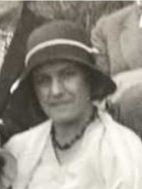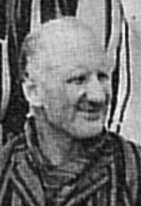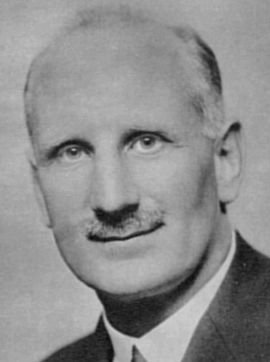Back to search results
Name: RHODES, Godfrey Dean CB, CBE, DSO (Brig.-General), Sir



Birth Date: 18 July 1886 Victoria, B.C., Canada
Death Date: 21 Feb 1971 Nairobi
First Date: 1920
Profession: Appointed Chief Engineer of Uganda Railway in 1920. General Manager 1928-42.
Area: Nairobi
Married: In London 11 Aug 1915 Marion Jessie 'Mollie' Topping b. 1891 Finchley, London, d. 25 June 1979 Uckfield
Children: Godfrey Hunter (21 Jan 1920 Hampstead-20 May 1965 Nairobi); John Henry (5 Aug 1923 Hampstead-1 June 2000 Berkshire); Katherine Marion 'Jill' (Legat) (10 Oct 1925-4 Oct 2014)
Book Reference: Permanent Way, Golf, Staff 39, Manual, Debrett, KAD, Red 25, Red 31, Colonial, Red 22, Rhodesia, CO, DSO, Dominion, Richardson
War Service: Royal Engineers
School: Trinity Coll. School, Port Hope & RMC, Kingston, Canada. RE (Retd), MEIC, M.INST.T, ASSOC.INST.C.E., MSASCE
General Information:
Permanent Way - Major Rhodes had earned considerable distinction before he came to Kenya. Born in Canada, he was educated at Trinity College School and at the Royal Military College at Kingston in Canada. There he won the Sword of Honour, and he was commissioned in the Royal Engineers in June 1907. Later he was awarded the Haynes Medal at the School of Military Engineering and posted to the North-Western Railway of India as an assistant engineer in 1910. In 1914 and 1915 Rhodes served in France as adjutant to the railway construction troops. By the following year he was commanding a railway construction company in Salonika. Promotion to temporary ranks, and honours, then came thick and fast. By 1917 Rhodes was a temporary colonel and a Director of Railways in Salonika.
From 1918-20 he was Director of Railways in the Army of the Black Sea at Constantinople, with the temporary rank of Brigadier-General. During the war he had been four times mentioned in despatches and appointed a Companion of the Distinguished Service Order and a Commander of the Order of the British Empire. The Governments of France, Greece and Serbia also bestowed Orders upon him, and he won a brevet to the rank of Major. Not until 1924 was he promoted a substantive major, but when he retired, 2 years later, he was granted the rank of Brigadier-General. In November 1920 Rhodes was serving as a major in the Royal Engineers when he was seconded from the Indian Railways to the Uganda Railway. ..............…..
Rhodes was granted the rank of Brigadier-General on his retirement in 1926. On Dec 1st 1926, he had been finally released from the Railway Dept. of the Govt. of India, and he was then admitted to the permanent and pensionable est ablishment of the Kenya and Uganda Railway.
Debrett - late RE (retired as Col. with hon. rank of Brig.-Gen.); formerly Special Commr. for Works, and Ch. Engineer, Govt. of Kenya; was Gen. Manager of Kenya and Uganda Railwaysw and Harbours 1928-41; European War 1914-19 as Director of Railways with Salonika Force and Army of Black Sea (despatches, DSO, Brevet Major, Orders of Redeemer of Greece, and White Eagle of Serbia, CBE, Officer of Legion of Honour), European War 1939-45 in Persia as Director of Transportation, in Iraq as DQMG Movements and Transportation, and in India as Regional Port Director, Calcutta (despatches twice, CB), a C.St.J.
KAD 1922 - Vice-President, Football Association of Kenya
Red 25 - Vice-President, Uganda Railway Rifle Club
Red 22 - President, Nairobi Railway Club
Red 22 - Vice-President and Chairman of Council, The Football Association of Kenya
Red 22 - Member of Council, The Football Association of Kenya - (Nairobi Railway Club)
Rhodesia - was born in British Columbia, and joined the Royal Engineers in 1907. In the 1914-18 war he served in France and then in Salonika as Director of Railways. He retired from the Army in 1926, and not long afterwards was appointed general manager of the Kenya and Uganda Railways and Harbours. In 1941 he went to Persia as Director of Transportation and at a later stage of the war he took charge of the port of Calcutta for the Government of India. Then he returned to Kenya, where he has been active in many good causes.
CO 533/371/3 - Confidential Reports 1927 - Reported as a very capable engineer and popular officer, but the OAG considers that he has recently shown himself somewhat lacking in administrative capacity.
Dominion - Public Works Department - Railways - Engineering - Chief Engineer - 1930
Richardson 1929 - "General Rhodes, General Manager of the line asked us into his private car where we met his wife, 2 small children and governess ………….. "
Golf - President of the Railway Golf Club 1929-41.
KAD 1922 - Chief Engineer, Uganda Railway
Gazette 19 Mar 1971 probate
Gazette 7 Dec 1979 wife's probate
Obituary on web Copyright © ICE Publishing, all rights reserved. Brigadier-General Sir Godfrey who was born on 18 July, 1886, died on 21 February, 1971. Hope, Ontario, and at the Royal Educated at Trinity College, Port Military College, Kingston, Ontario, graduating with Honours, he received a commission in the Royal Engineers in 1907. After study at the School of a year with the London and South Military Engineering, Chatham, and Western Railway, he was in 1910 posted to India as an Assistant Engineer with the State Railways. gaged on the design and construction For the next four years he was enof new railways in the north-west On the outbreak of war in 1914 he was posted to France where he was Punjab. engaged on railway construction work until transfer in 1915 to the Salonika front, where he remained until 1919, ending his service there as Director of Railways with the rank of Brigadier-General. For his services in World War I he was three times mentioned in dispatches and was awarded the DSO, CBE, Legion of Honour (Officer), Order of Redeemer (Greek) and the Order of the White Eagle (Serbian). .~ In 1921 Rhodes was seconded from the Royal Engineers to be Chief Engineer of the Uganda Railway (completed less than 20 years before). The system consisted of the main line from Mombasa to Kisumu, the military branch from Voi to Kabe, the Magadi branch, the Thika tramway and two isolated lines in Uganda. Traffic had grown rapidly during and after the First World War. In this turbulent phase of swift expansion when each year’s earnings set new records it was clear that much had to be done quickly to increase the capacity of the railway and extend its services. In this task Rhodes played a energy and enthusiasm. notable part as Chief Engineer, throwing himself into the work with great Within seven years work was almost completed on the Uganda extension from Eldoret to Mbulamuti on the Busoga Railway, the Thika-Nyeri line and on the Thomson’s Falls, Solai, Kitale, Soroti and Buters Branches. These extensions and the improvement of the main line from Mombasa to Nairobi were carried out by a mixture of contract and departmental work-a system which with the best use of available materials ensured low capital costs. Of this period the author of ‘Permanent Way’ (a history of the Kenya Uganda Railway) comments, ‘If it had not been for the bold expansionist programme there would have been a complete breakdown of the railway in 1925’. After the untimely death of Sir Christian Felling in August 1928, Rhodes was appointed General Manager of what was now the Kenya and Uganda Railways and Harbours: later that year construction of the final link in the system from Jinja to Kampala was authorized. In 1929 the first signs of the great world depression appeared: imports declined rapidly and prices of the products of Kenya and Uganda fell sharply, while because of drought and locusts crops were poor. The period 1929-33 was critical and drastic measures had to be taken. Staff at all levels were retrenched, salaries cut and rigorous economy exercised. From the depths of the depression the railway emerged strong-well able to deal with the growth of traffic from the middle ’thirties and with the much heavier demands of the second world war. At this time and throughout his years of management, Rhodes was frequently under fire from public opinion, but events invariably proved his policy to have been well-judged; his successors have cause to be grateful for his firm conviction of what was right in the utilization of available resources. The development of the railway system of Kenya and Uganda (now forming part of the East African system) as it exists today owes much to his vision and his unflagging energy. But he was not interested only in the physical aspects. Service to the public and welfare of the staff were always much in his mind and nothing was too small for his attention. He won the unswerving loyalty of railwaymen of all grades and the confidence of the users. He was intensely proud of the undertaking which he had done so much to expand and improve and it gave him great pleasure to see it continue to meet the transport needs of Kenya and Uganda, both during his term of office and his years of retirement. For his services to Kenya and Uganda Rhodes was knighted in 1934. By 1941 as East Africa became less directly involved in the Second World War, Rhodes wished to play a more active role. He retired from the Kenya and Uganda Railways and Harbours to re-enter military service. In turn he held posts of Director of Transportation in Teheran, Deputy QuartermasterGeneral (Movements and Transportation) at the headquarters of the Persian and Iraq Force (PAIFORCE) in Baghdad, and Regional Port Director, Calcutta. The task in Persia was particularly difficult as it involved assuming operational control of the Trans-Iranian Railway, a principal supply route to Russia. For his services in the Second World War he was three times mentioned in dispatches and was awarded the CB. Rhodes returned from military service to live in Kenya. He was for a period Chief Representative in Africa for Sir Alexander Gibb and Partners. From 1948-51 he was Chief Engineer and Special Commissioner for Works in Kenya. He did much to rationalize the widely varied activities of the Ministry of Works and place them on a sound organizational basis. In spite of his manifold activities, Rhodes gave himself generously in the public service. He vigorously supported the St John’s Ambulance and maintained a strong unit in the railway. He was created a Knight of St John and Commander of St John’s Ambulance. He was also Director of the Red Cross Association. Perhaps he found his greatest satisfaction in the developafter he had nurtured its growth from small beginnings to a Kenya-wide ment of the Scout Movement, in which he became the Chief Scout of Kenya organization. cricket matches in Kenya and was an above-average performer at hockey and Rhodes was an outstanding sportsman. He played in many representative tennis. In his later years he derived much pleasure from golf. Those who worked with him over the years will not forget his catholic interests, breadth of intellect, sound judgement and capacity for friendships. His devotion to public service, his charity and humanity were an example to all with whom he came in contact. Rhodes was elected an Associate (a category now termed Companion) in 1926. He wa survived by his widow, one son and one daughter.
Back to search results



